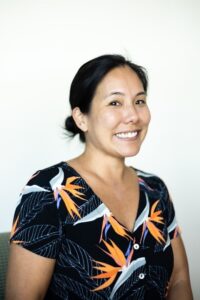
It is estimated that one in five youth will suffer from some type of mental health disorder by age 18. Anxiety is one of the most common mental health disorders, affecting 31.9% of youth, and is often associated with other mental health concerns like depression and suicide (Merikangas, 2010). There are modular youth treatments that build youth skills to address these concerns. This training will provide resources to mental health and school professionals on identifying anxiety in youth and understanding different symptoms as they relate to typical developmental trajectory. The training will also provide strategies to address worry in youth, especially youth of color, with free resources to help in the identification and treatment of anxiety disorders. An important emphasis will focus on culturally adaptive anxiety and how to best meet youth needs.
Learning Objectives:
Kelsie Okamura

Kelsie Okamura (she/her) is an Implementation Researcher at the Baker Center for Children and Families, a Harvard Medical School affiliate, and a licensed psychologist. Dr. Okamura serves on the training, consultation, and distance learning development teams at PracticeWise, LLC. She received her BA in Psychology with Honors and PhD from the University of Hawai‘i at Mānoa. Dr. Okamura completed her predoctoral internship at I Ola Lāhui Rural Hawai‘i Behavioral Health and postdoc at the University of Pennsylvania Center for Mental Health. Dr. Okamura was both a NIMH Child Intervention, Prevention and Services (CHIPS) and Training in Dissemination and Implementation Research in Health (TIDIRH) fellow; and has more than 30 peer-reviewed journal articles and book chapters. She currently serves as Leader for the ABCT Dissemination and Implementation Science Special Interest Group and is a Diversity, Equity, and Inclusion Advisory Group Member to Implementation Research and Practice. Dr. Okamura is passionate about community-based public-sector service system implementation, particularly (a) knowledge formation, (b) quality improvement initiatives that bridge team-based technology, and (c) financial strategies to improve implementation. She is currently funded through the Substance Abuse and Mental Health Services Administration (Co-PI, System of Care Expansion Award), and has received funding through the National Institute for General Medical Services, Robert Wood Johnson Foundation, and American Psychological Foundation. As a fourth-generation daughter of Japanese and Okinawan immigrants to Hawaiʻi, Dr. Okamura has a deep appreciation of understanding diversity, culture, and contexts as they apply to youth mental health implementation. Growing up in a rural town in Oʻahu, Hawaiʻi has afforded her insight into the complexities of socioeconomic and cultural barriers that may impede successful implementation of youth psychosocial interventions.
Tessa Palafu

Tessa Palafu (she/her) is an Implementation Research Assistant at The Baker Center for Children and Families, Implementation Research Division. Tessa grew up in Hawaiʻi and recently graduated from Hawaiʻi Pacific University with a Bachelor of Arts in Psychology and Political Science. Throughout her undergraduate career, Tessa was introduced to the world of research by wonderful mentors, like Dr. Kelsie Okamura. Her research interests include understanding Historical Trauma in Native Hawaiian and Pacific Islander (NHPI) populations and developing culturally grounded approaches to mental health services for NHPI. Tessa has worked on a variety of research projects related to examining the relationship between houselessness, historical trauma, and perceived stress in NHPI youth, understanding predictors of measurement-based care use for clinicians, and looking at barriers and facilitators to implementing a substance use prevention program within a school district. She is excited to continue her work at the Baker Center and support ongoing quality improvement initiatives.